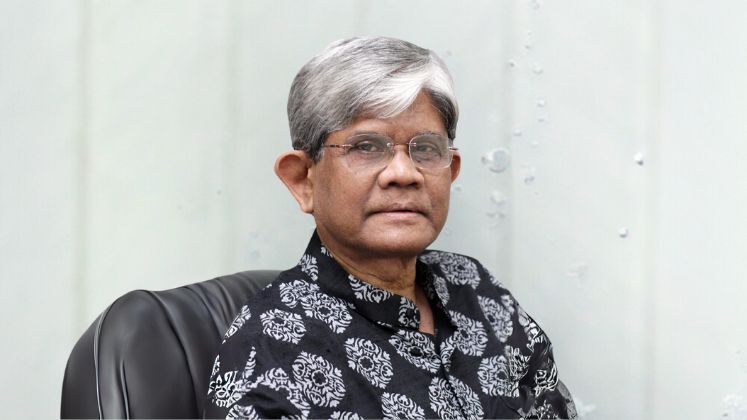
Bangladesh has been grappling with a host of issues, including a currency crisis. Last month, in line with its transition from LDC, the government abolished incentives to the RMG sector. However, it later rolled back for certain products. In a wide-ranging interview with Apparel Resources (AR), former Governor of Bangladesh Bank, Salahuddin Ahmed, discusses a number of issues facing the country. Here are the excerpts from the interview.
AR: Low dollar reserves have only gotten worse over the last several months! Why did the situation arise and now what?
Salahuddin: I think the dollar crunch or the crisis of dollars started about two years back. What the Bangladesh Bank has done is that it has kept the taka valuation against dollar almost constant. The central bank artificially controlled the exchange rate by selling dollars to the banks and market. Countries around the world, including India, Malaysia, Indonesia, Nepal, Pakistan and Sri Lanka, devalue their currencies from time to time, but Bangladesh didn’t do that. Whereas they could have allowed some devaluation. But now suddenly the depreciation has been around 27 per cent or 28 per cent from 82 to 110. It has made matters worse for bankers and businessmen.
In order to stabilise the currency, Bangladesh Bank sold about US $ 12 billion in a very short period, and in total, it has sold more than US $ 20 to US $ 22 billion in the open market. That has led to the depletion of foreign reserves. Over the last two years, the inflow of dollars is much less than the outflow. Sound policies could have been introduced to control inflation and also to increase supply, which means more exports, export diversification and remittance, more importantly, flow of foreign direct investment and foreign portfolio investment. If we look at the balance of payment statement, the financial account is negative. It’s quite a huge number. So, unless we make it positive, it will be very difficult to stabilise the taka value or meet the demand of the dollar which is needed for imports and other uses like debt repayments.
AR: After the dollar crisis, we are now facing a taka crunch. How has this come about?
Salahuddin: When the Bangladesh Bank sells dollars to the banks, what happens? It takes money from the banks in exchange of dollars, the banks get the dollars from the central bank. In that way, the money at hand with the commercial banks decreases. So the money from commercial banks goes to the central bank’s account.
Over time, people have somewhat lost confidence in the banking sector. There are many reasons. Recently, some banks were given equity support by printing and supplying them money, which has added to inflation and has not been under control since.
AR: Reforms in the banking sector! How hopeful are you about this?
Salahuddin: The Bangladesh Bank usually issues instructions because that is their job and they should do it. But the problem is, giving orders and just instructions will not help. You must give concrete advice and banks are supposed to follow the norms, guidelines and all kinds of rules and principles under the Banking Company Act, under Basel 1, 2, 3 and under international norms. Compliance is one of the most important things, but what happens is that these orders often go unheeded. If a bank doesn’t follow its instructions within a specific period of time, the central bank can give them some time and then it should initiate actions. But that is not being done. The result is that the private banks have lost credibility among depositors.
There is one other issue. A sizeable portion of banking loans and deposits are with the nationalised commercial banks or the state-owned commercial banks like Sonali, Agrani, Janata and Rupali. They usually comply with government instructions, but they, too, sometimes, bypass the central bank’s instructions. As a result, many of these banks have large default loans and the figure is more than 20 per cent.
| Countries around the world, including India, Malaysia, Indonesia, Nepal, Pakistan and Sri Lanka, devalue their currencies from time to time, but Bangladesh didn’t do that. Whereas they could have allowed some devaluation. |
AR: The government offers a range of fiscal and non-fiscal incentives, privileges and facilities to promote investment. What more is expected?
Salahuddin: In my opinion, these schemes are not properly devised. Some of the incentives have gone to very inefficient industries. Bangladeshi industries, especially RMG, are not very competitive. Here, the level of productivity is one of the lowest in the world. The wage rates in Cambodia, Vietnam, India and even in Pakistan are much higher. But they are earning profits because of technology and management and hence the productivity is very high. The RMG industry needs to increase efficiency.
So the incentive thing is kind of an ‘infant industry’ argument. With all respect and compliments to the RMG industry, they should now give attention to increased productivity. WTO regulation will not allow subsidies and incentives when we move forward to the developing country category and upper middle-income country.
Gradually, the incentives will be reduced, the EDF fund of Bangladesh Bank will be reduced and even the tax benefits will be reduced. So the country has to be prepared for that. The government should engage with the stakeholders to chalk out a phase-wise plan to address the withdrawal or reduction of these incentives.
The government should go for export diversification, not solely depending on RMG, that is putting all the eggs in one basket. So diversification must be there: diversification of products and destinations of exports. Why is China so successful? You just name a product, they export it. You just name the countries and they export to that destination too. On the other hand, India has not been able to do that.
Another most important thing the government should do is to encourage the small-medium industries. You see these industries are labour-absorbing. They provide employment and they also add value like the real sector (production) of the economy. So just growth in big industries is not good enough. Go for modernisation, go for individual development and go for productivity!
One of the major handicaps is our missing mid-management. I have seen many Sri Lankans and many Indians in the managerial capacity. That’s not a very good sign either. You can blame that our graduates from universities are not good enough. I seriously think that they are good enough, they will be good enough if given the chance.
| Gradually, the incentive will be reduced, the EDF fund of Bangladesh Bank will be reduced and even the tax benefits will be reduced. So the country has to be prepared for that. |
AR: Despite several challenges, Bangladesh’s per-capita income is higher than developing countries like India. Do you think that this will be sustained in the future?
Salahuddin: I think it will grow, with proper policies in place and if different sectors are given incentives, including small and big garment exporters. We have contact with the world, our private sector is quite efficient. However, our business environment is not very congenial for Bangladeshis as well as for foreign investors. Since the regulatory bodies are very strict, the approvals are time-consuming and a lot of officials do dilly dallying. So if we do not improve, we could possibly be trapped in a moderate role of growth. We have to increase our growth, and for that, we have to create a really good investment environment. More importantly, we have to pay attention to sustainable economic development.
AR: The next generation is into entrepreneurship and innovations. What is your suggestion to the young talents of Bangladesh to make the country a strong economy?
Salahuddin: Young people should now come forward and should be given all the facilities and incentives. But the government policies are not properly implemented or not operational. Young people with education and training are not getting access to finance, whereas they should be given chances so that they become self-employed. Even in some cases, young people are not given any chance by regulatory bodies. They have to go from pillar to post to get trade licenses and access to finance and government incentives. Unless you address these, you cannot get demographic dividends from a large number of vibrant youths. And there should be equality, justice, rule of law, transparency and accountability. If they are not there, then nobody can prosper and young people will face more difficulties.






